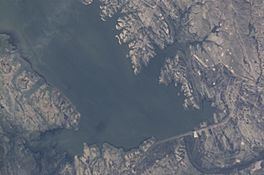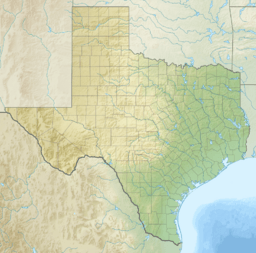Falcon International Reservoir facts for kids
Quick facts for kids Falcon International Reservoir |
|
|---|---|
| Presa Falcón | |
 |
|
| Location | Zapata / Starr Counties, Texas, United States; Nueva Ciudad Guerrero, Tamaulipas, Mexico |
| Coordinates | 26°33′32″N 99°09′53″W / 26.55889°N 99.16472°W at Falcon Dam |
| Type | Hydroelectric reservoir |
| Primary inflows | Rio Grande |
| Primary outflows | Rio Grande |
| Basin countries | United States, Mexico |
| Surface area | 83,654 acres (33,854 ha) |
| Max. depth | 110 ft (34 m) |
| Surface elevation | 301 ft (92 m) |
Falcon International Reservoir, also known as Falcon Lake, is a large reservoir located on the Rio Grande. It sits about 40 miles (64 km) southeast of Laredo, Texas, in the United States, and Nuevo Laredo, Tamaulipas, in Mexico. This huge lake touches Starr and Zapata Counties in Texas. On the Mexican side, it borders the city of Nueva Ciudad Guerrero in Tamaulipas.
The reservoir was created when the Falcon Dam was built. This dam helps with many important things. It saves water, provides water for irrigation (watering crops), helps control floods, and even generates hydroelectricity (power from water).
The dam was officially opened in October 1953. Both the Mexican President, Adolfo Ruiz Cortines, and the U.S. President, Dwight D. Eisenhower, were there. The lake and dam are managed together by the governments of the United States and Mexico. They do this through a group called the International Boundary and Water Commission. This group was started in 1889 to manage the border, share river water, and help with flood control and clean water. The lake is named after María Rita de la Garza Falcón. A town named Falcon, which was covered by the lake, was also named after her.
Contents
Fish and Wildlife at Falcon Lake
Falcon International Reservoir is home to many kinds of fish. Some of these fish were added to the lake to make it a better place for fishing. You can find fish like largemouth bass, crappie, catfish, and channel catfish here.
The number of bass in the lake has been going down. This has meant fewer fishermen and tourists visit the lake. In 2012, Falcon Lake was known as the best place for bass fishing in the United States. By 2014, it had dropped to 12th place. Even with some past safety concerns, the lake is now much safer. A Texas lawmaker even called it "the safest park on the border."
Alligator gar are very large and heavy fish that live a long time. They eat largemouth bass and can survive even during droughts. In 2009, rules were made about how many alligator gar could be caught. However, some local people believe there should be no rules and that these fish should be removed from the lake.
Around the shores of Falcon Lake, you can find many interesting plants. These include Texas wild olive, Mexican oregano, hibiscus, mesquite trees, huisache, and prickly pear cactus. Many animals also live in the park. You might see Greater roadrunners, collared peccaries (which look like wild pigs), white-tailed deer, and black-tailed jackrabbits.
Fun Activities at Falcon State Park
Falcon State Park is a large area of about 572.6 acres (2.3 km2). It is located between Falcon Heights, Texas, and Nueva Ciudad Guerrero, Tamaulipas. This park is at the southern end of the huge International Falcon Reservoir.
The main things to do at the park include camping, swimming, fishing, water skiing, and boating. There is also a nature trail you can explore on your own. Bass fishing is especially popular on the lake, which covers about 98,960 acres (400 km2).
Climate Around the Lake
The weather information for Falcon Dam, Texas, is recorded near the southeast part of the reservoir.
| Climate data for Falcon Dam, Texas | |||||||||||||
|---|---|---|---|---|---|---|---|---|---|---|---|---|---|
| Month | Jan | Feb | Mar | Apr | May | Jun | Jul | Aug | Sep | Oct | Nov | Dec | Year |
| Mean daily maximum °F (°C) | 69.5 (20.8) |
74.6 (23.7) |
82.4 (28.0) |
89.1 (31.7) |
94.9 (34.9) |
99.0 (37.2) |
100.3 (37.9) |
100.9 (38.3) |
94.6 (34.8) |
88.2 (31.2) |
79.4 (26.3) |
70.3 (21.3) |
86.9 (30.5) |
| Daily mean °F (°C) | 58.2 (14.6) |
62.7 (17.1) |
69.6 (20.9) |
76.0 (24.4) |
82.5 (28.1) |
86.7 (30.4) |
87.6 (30.9) |
87.9 (31.1) |
83.1 (28.4) |
76.4 (24.7) |
67.8 (19.9) |
59.1 (15.1) |
74.8 (23.8) |
| Mean daily minimum °F (°C) | 46.9 (8.3) |
50.7 (10.4) |
56.7 (13.7) |
63.0 (17.2) |
70.2 (21.2) |
74.3 (23.5) |
74.8 (23.8) |
74.9 (23.8) |
71.6 (22.0) |
64.5 (18.1) |
56.2 (13.4) |
47.9 (8.8) |
62.6 (17.0) |
| Average precipitation inches (mm) | 1.00 (25) |
0.99 (25) |
0.67 (17) |
1.57 (40) |
2.38 (60) |
1.98 (50) |
1.99 (51) |
2.10 (53) |
4.04 (103) |
1.77 (45) |
1.18 (30) |
0.93 (24) |
20.60 (523) |
| Source: NOAA Climate Data Online | |||||||||||||
See also
 | William Lucy |
 | Charles Hayes |
 | Cleveland Robinson |




